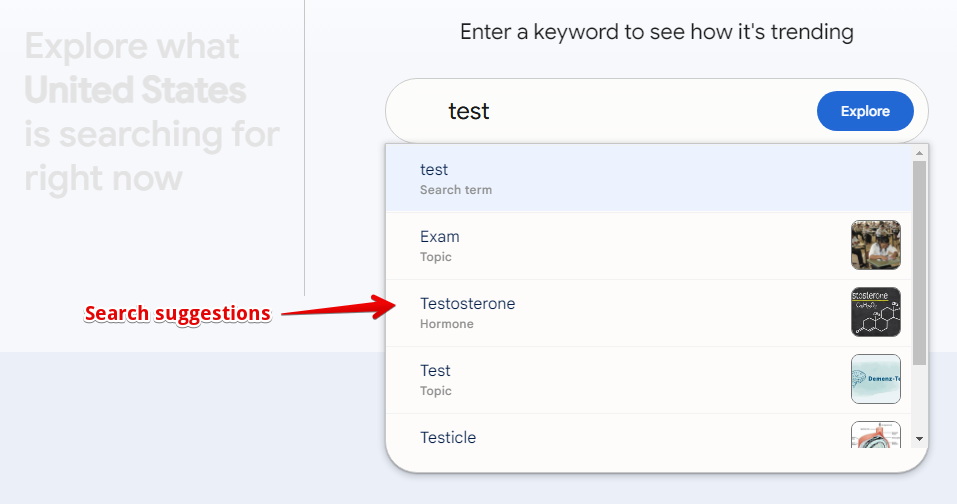SE::Google::Trends::Suggest - Google Trends Suggestion Scraper
Overview of the scraper
A scraper for search suggestions by keywords in Google Trends. The Google Trends suggestion scraper solves one of the main SEO tasks, namely the rapid, automated retrieval of an expanded semantic core. Thanks to the SE::Google::Trends::Suggest scraper, you can automatically collect keyword bases from Google Trends suggestions based on a query. Using the SE::Google::Trends::Suggest scraper, you can easily and quickly scrape Google Trends suggestions based on a query.
Thanks to the multithreaded operation of A-Parser, the query processing speed can reach 2000 queries per minute, which on average allows you to get up to 10000 results per minute.
You can use automatic query multiplication, substitution of sub-queries from files, iteration of alphanumeric combinations and lists to get the maximum possible number of results. Using results filtering you can immediately clean the result, removing all unnecessary garbage (using negative keywords).
A-Parser's functionality allows you to save the scraping settings for the SE::Google::Trends::Suggest scraper for future use (presets), set a scraping schedule, and much more.
Results can be saved in the format and structure you need, thanks to the built-in powerful templating engine Template Toolkit which allows you to apply additional logic to the results and output data in various formats, including JSON, SQL and CSV.
Collected data
- Query suggestions
- suggestion
- suggestion description (its type)
- image link
- topic ID

Use cases
- Collecting keyword bases
Queries
As queries, you need to specify search phrases, for example:
write essay
Football
Waterfall
Speak in english
Cats and dogs
forex
cheap essay
Query substitutions
You can use built-in macros for automatic substitution of sub-queries from files. For example, if we want to add a list of other words to each query, we can specify several main queries:
essay
article
thesis
In the query format, we will specify a macro for substituting additional words from the file Keywords.txt, this method allows you to increase the variability of queries manifold:
{subs:Keywords} $query
This macro will create as many additional queries as there are in the file for each initial search query, which in total will give [number of initial queries (domains)] x [number of queries in the Keywords file] = [total number of queries] as a result of the macro's operation.
For example, if the file Keywords.txt will contain:
buy
cheap
Ultimately, the substitution macro will turn 3 main queries into 6:
buy essay
cheap essay
buy article
cheap article
buy thesis
cheap thesis
Output results examples
A-Parser supports flexible results formatting thanks to the built-in templating engine Template Toolkit, which allows it to output results in an arbitrary form, as well as in a structured format, such as CSV or JSON
Exporting the list of suggestions
Similar to SE::Google::Suggest.
Output in CSV table
Similar to SE::Google::Suggest.
Saving in SQL format
Result format:
[% FOREACH results;
"INSERT INTO serp VALUES('" _ query _ "', '"; suggest _ "')\n";
END %]
Example result:
INSERT INTO serp VALUES('write essay', 'Exam')
INSERT INTO serp VALUES('write essay', 'Testosterone')
INSERT INTO serp VALUES('write essay', 'Test')
INSERT INTO serp VALUES('write essay', 'Testicle')
INSERT INTO serp VALUES('write essay', 'TestNav')
...
Dump results to JSON
Similar to SE::Google::Suggest.
Results processing
A-Parser allows you to process results directly during scraping, in this section we have provided the most popular use cases for the SE::Google::Trends::Suggest scraper
Filtering results (using negative keywords)
Similar to SE::Google::Suggest.
Available settings
| Parameter name | Default value | Description |
|---|---|---|
| Language | English | Language selection |